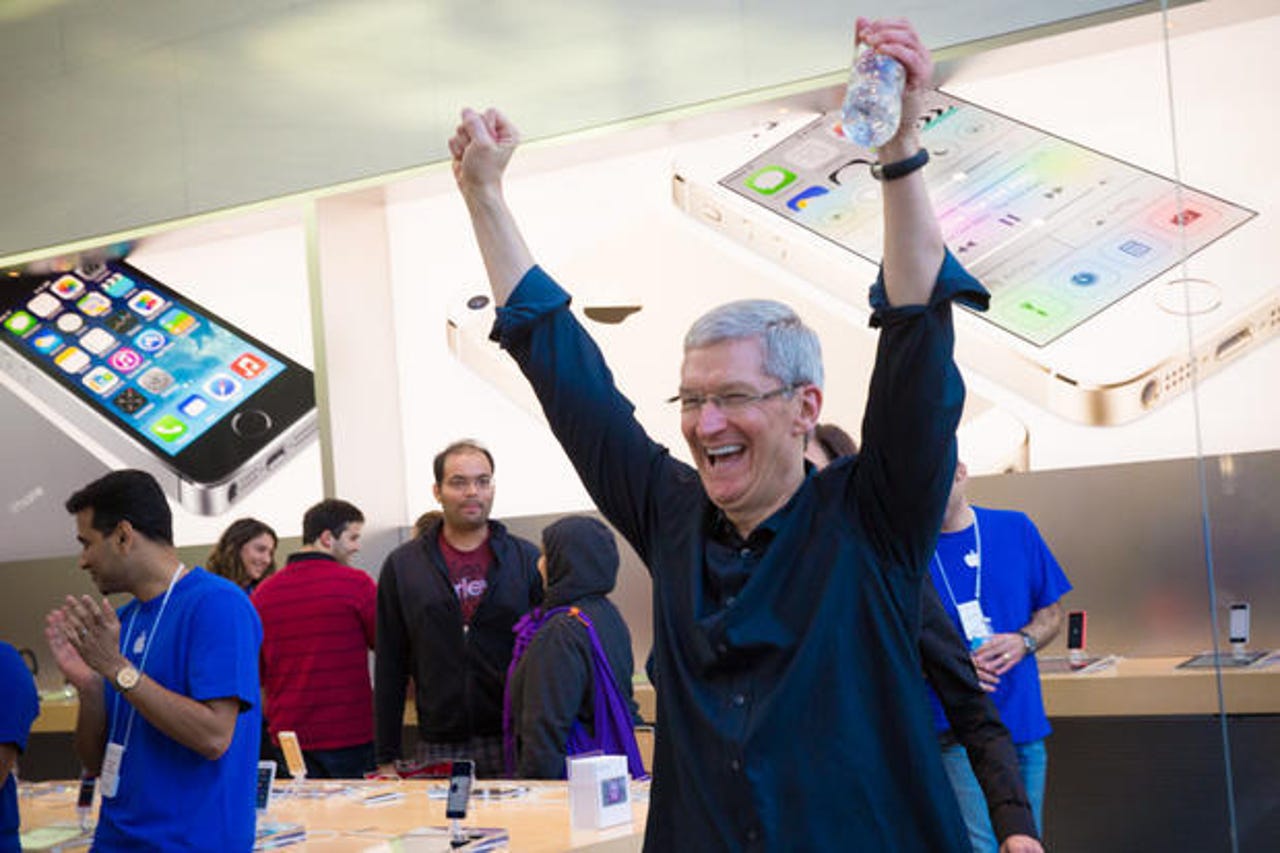Apple Q4: Cook talks Apple Pay; IBM deal; Mac-iPad convertible?

Breaking news: the Mac is back.
Apple's fiscal fourth quarter results blasted Wall Street expectations by a long-shot. Just when you thought the PC market was on its last legs, Apple's desktop and notebook line-up grew by 21 percent year-over-year. That at least helps the company regain some of the loss the company stomached in reporting a 13 percent decline in iPad sales during that same period.
iPhone sales continued to be the highlight of the show. Making up more than half of the company's quarterly revenue, iPhone remains the most important Apple division, growing by 16 percent year over year.
And, the rising star of the company's revenue pie chart is its iTunes and Software & Services unit, which powers its desktop, mobile, and living room e-commerce play. The unit generated only a slice of Apple's quarterly revenue, but grew almost 10 percent year over year.
But its iPad unit remains a concern. Apple partnered with IBM earlier this year in efforts to bring custom-based enterprise apps to a number of crucial vertical industries. Apple gets more of a hook in the enterprise market, while IBM gets the cool factor and a boost to its software and analytics stacks.
Apple chief executive Tim Cook and chief financial officer Luca Maestri were on the follow-up earnings conference call with analysts and press.
Here's what was said:
Mac, iPad convertible on deck? Probably not
Mac saw its first real "blow-away quarter" in a long time, Cook said. Apple hasn't seen this level of Mac market share since 1995.
Read more on CNET
Meanwhile, its iPad share is falling — down 13 percent year-over-year. Cook cited the "negative commentary" in the market on the iPad as looking at its tablet unit over a three-month period, and didn't see the long game.
"I see it as a speed bump, and not a huge issue. That said, we want to grow. We don't like negative numbers on these things. And so looking further in the data, I know there's a popular view that the market is saturated. We don't see that."
Is the iPad market saturated? No, he said. "You never have first-time buyer rate at 50 or 70 percent. But you do see people hold onto their iPad longer than their iPhone. We don't know what the upgrade cycle will be for people."
His comments land just a few days after Apple's software engineering Craig Federighi basically effectively ruled out the idea of merging the tablet and desktop product.
The bottom line? Likely not, Cook hinted, but he didn't flat-out rule it out. "I'm very bullish of where we can take iPad over time."
Apple-IBM partnership gets some legs
Little is known about the full scope and breadth of the Apple-IBM deal. But it's starting to get some meat on its bones.
Read more on Apple-IBM
The deal, first announced in July, has yet to really take off, giving Samsung the space to push ahead with its own enterprise "across-the-board" set of solutions.
Apple has always said that it will push ahead with its app development during the fourth quarter of 2014 and into the coming calendar year. Those apps, backed by IBM's cloud services and data analytics, are set to hit corporate customers in next month across six major verticals, including healthcare and banking.
Apple said enterprise developers have shot up by a near 40 percent rise in the past year.
Hundreds of companies have wanted to get in on the Apple-IBM action, according to Maestri. He said Apple is now working with over 50 corporations and businesses to act as the foundations.
Apple Pay: Who pays for it? Not us, as it turns out
Could Apple Pay one day be a standalone business? Probably not, Cook hinted, who fielded a question from an analyst.
Read more on Apple
Cook suggested that because Apple Pay, its homebrew mobile contactless payments service, is only available for iPhone 6 and iPhone 6 Plus, it could further drive sales in its lucrative smartphone division.
Cook said that most companies will try to monetize the data — taking a stab at companies like Amazon and Google, like he did last month in an interview with PBS' Charlie Rose. But Apple will not, Cook reaffirmed.
On the business model side of things, Cook said Apple does not charge the customer or the merchant for using Apple Pay. "There are commercial terms between Apple and the issuing banks," he said, but declined to comment further.
That's a twist from traditional mobile wallets, which often take a small cut from the customers themselves. Also, card issuers often charge merchants to charge credit cards in their stores.
The slice of each purchase is said to be 0.15 percent, according to an earlier story from The Financial Times (paywalled).
Revenue generated from Apple Pay will be reported as part of the company's new Services division, which will make its debut in Apple's fiscal first-quarter earnings in January.
Other numerical nuggets
41 percent of all Apple retail stores are outside the U.S.
437 Apple retail stores around the world
46 percent increase in sales from emerging markets
1 percent of all Apple's revenue came from the iPod, which will now be rolled into Apple's "other" division.
0 hints on what the next big thing will be. Cook hinted that there would be new products and services in the pipeline, but he said he "can keep that within the 'cone of silence'."
